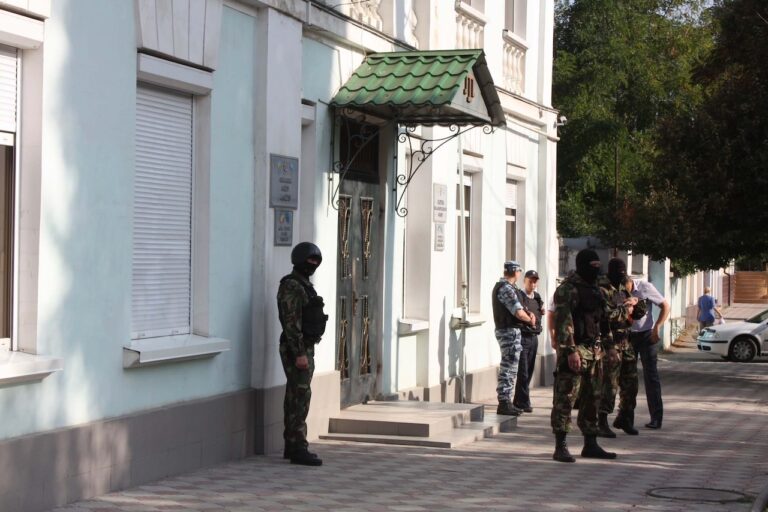Unidentified assailants attacked the apartment and office of Russian human rights activist Stanislav Dmitrievsky.
(Human Rights Watch/IFEX) – 7 November 2012, Moscow – Russian law enforcement should promptly and effectively investigate attacks in recent days on a leading human rights activist, his family members, and his colleagues, Human Rights Watch said today. Russia should hold the perpetrators accountable and deliver on its pledges to foster a normal working climate for civil society.
The attacks took place in the days before a pro-democracy protest planned for November 4, 2012, in Nizhny Novgorod, about 270 miles from Moscow. Unidentified assailants attacked the apartment and office of the human rights activist Stanislav Dmitrievsky, who is also involved in the local protest movement.
“We are very concerned about the attack and the implicit threats to the safety of Dmitrievsky and his family,” said Hugh Williamson, Europe and Central Asia director at Human Rights Watch. “It appears to be yet another effort to intimidate and discredit political criticism in Russia.”
Russia’s international partners should call on the Kremlin to reverse the increasingly hostile environment for civil society in Russia, Human Rights Watch said.
Two men attacked Dmitrievsky’s apartment at 4:30 a.m. on November 4 while Dmitrievsky was away and his wife and teenage daughter were home alone. The assailants wore hooded jackets, face masks, and gloves, and were armed with heavy hammers. They broke the apartment windows of the ground floor apartment and manipulated the lock on the door so that his family could not get out. Their actions were recorded by video cameras that Dmitrievsky, a frequent victim of harassment and attacks, had installed on his door and windows.
Dmitrievsky told Human Rights Watch that his wife, awakened by the noise, immediately called the police. A police officer arrived over an hour later and, according to Dmitrievsky, was dismissive. The officer made it clear that he was not going to bring in investigation personnel and that he did not feel the matter merited police attention. Several hours later, after local human rights lawyers intervened, police investigators finally arrived to photograph evidence and take the videotapes from the security cameras.
Two days later, Dmitrievsky found out from his elder daughter, who lives on her own in another part of the city, that the lock on her apartment door had been similarly manipulated that same night. The young woman realized something was wrong when she tried to leave the apartment in the morning, thought it was a prank, and had friends help her open the door from the outside.
“With the increasing crackdown on government critics, this is not the first time we have witnessed activists’ family members targeted as a way to discourage activists from continuing their work,” Williamson said. “This outrageous tactic should stop immediately.”
On November 1, unknown assailants attacked the office of the Group of Free People, the organization in which Dmitrievsky plays a leading role. The group hosts regular meetings of the Civil Council, a coalition of local civil society groups engaged in pro-democracy rallies.
The attack on the group’s office was similar to the attack on Dmitrievsky’s apartment. At 4:30 a.m. four men smashed the office windows with hammers and metal bars. The assailants wore hooded jackets, face masks, and gloves. They poured a pail of orange paint into the office, an apparent reference to the “Orange Revolution” in Ukraine of 2004. Opponents often accuse Russia’s protest movement of trying to stage an “Orange Revolution” in the country.
A police officer arrived approximately 40 minutes after being called, and an investigation team followed two hours later to examine the crime scene and obtain video records from the office security camera.
The same day, Dmitrievsky and his colleagues found numerous leaflets in the city center with photo-shopped images depicting Dmitrievsky and another prominent protest activist in bathing suits, implying that they were in a homosexual relationship. The leaflets said that those who attend the political protest rally on October 4 would be admitting their true sexual orientation. Other leaflets depicted Dmitrievsky in a suit standing amid a montage of several local opposition leaders with photo-shopped images to make them appear naked, also with slogans calling them gay.
“It is especially cynical and disgusting when homophobic views, which are unfortunately widespread in Russia, are being use to discredit activists in the eyes of the public,” Williamson said. “Russia should fight homophobia instead of fighting civil society activists.”
On March 24, there was an attempted arson attack on the Group of Free People’s office. An unidentified man in a hooded jacket broke one of the windows and was about to throw in a bottle with a gasoline-like substance when the landlady, awaked by the noise, frightened him off. A criminal investigation was opened, but no one has yet been held accountable.
“Just like last weeks’ attacks, the earlier arson attempt was clearly aimed at intimidating civil society activists in Nizhny Novgorod,” Williamson said. “The lack of effective investigation into that crime emboldened the perpetrators and essentially gave a green light for future attacks.”


